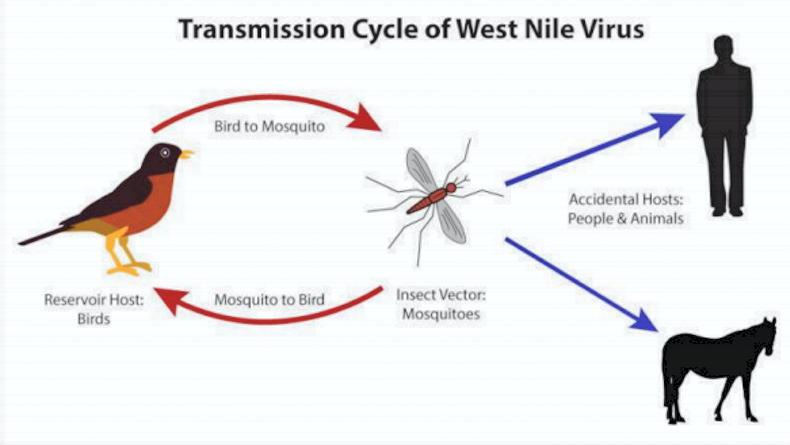WEST Nile fever (WNF) is caused by West Nile virus (WNV). The disease is primarily transmitted by vectors such as mosquitoes, with birds as maintenance hosts and humans and horses as spill over hosts.
Until recently, within Europe reports have been confined to Mediterranean and Eastern European countries. However, since 2018, the virus has spread further into Northern European countries. Throughout 2020, there were approximately 191 reported cases or outbreaks among birds and horses across nine European countries, including Spain, Germany, Italy, France, Bulgaria, Portugal, Austria, Greece, and Hungary.
Considering the increasing number and distribution of WNV cases being reported across mainland Europe on a yearly basis, there is a risk that Irish horses travelling to and returning from the continent during periods of increased mosquito activity may be exposed to the virus and develop clinical signs of infection.
WNF in horses is a notifiable disease in Ireland. Therefore, all suspect clinical cases or positive/inconclusive laboratory test results must be reported to the Department of Agriculture, Food and the Marine (DAFM) immediately, using the contact details provided at the end of this article.
Transmission
As WNV is principally vector-borne, most cases are reported during months associated with peak mosquito activity, such as June, July and August. Importantly, infected horses do not develop high levels of virus in their bloodstream and should not pass the virus on to other biting mosquitoes.
Although the risk to handlers is minimal, precautions should still be taken by any persons handling blood products or tissues from these animals, such as veterinarians.
Clinical signs
Most horses infected with WNV will show few if any clinical signs. In a small number of cases only, affected horses may demonstrate neurological disease, and may display one or more of the following:
For clinically affected horses, there are no specific treatments other than supportive care.
Once fully recovered, horses can resume normal activities and do not pose a risk to humans.
Unfortunately, if infected horses fail to recover, humane euthanasia may be necessary.
Prevention
Vaccination is an important method of protecting horses from WNV infection. Within Europe, a number of commercial WNV vaccines are available. For Irish horses travelling to affected European countries or regions, it is strongly advised that horses have received and completed a WNV vaccination schedule before departing.
While abroad, horses should be protected from exposure to mosquitoes, and precautions may include the use of mosquito screens, insect repellents and stabling during periods of peak mosquito activity, for example at dawn and dusk.
Public health risk
WNV is a zoonotic disease, an animal associated disease which may affect humans. Currently, the virus is spreading throughout Europe, with an increasing number of human cases and deaths in recent years.
Typically, WNV transmits to people if they are bitten by infected mosquitoes. Most infected individuals do not develop any symptoms. If present, clinical signs may include flu-like symptoms (fever, headache, and weakness) or more seriously, neurological disease and death.
There is no human vaccine for WNV. Like horses, people travelling to affected countries and regions are advised to protect themselves against mosquito bites. Anyone showing clinical signs should seek medical attention as soon as possible.
Conclusion
- If WNV is suspected either on clinical grounds or following laboratory test results, the DAFM must be notified without delay, either by contacting your local Regional Veterinary Office ttps://www.gov.ie/en/publication/cc6cee-regional-veterinary-offices/ or the out-of-hours exotic disease hotline on 1850-200-456.
